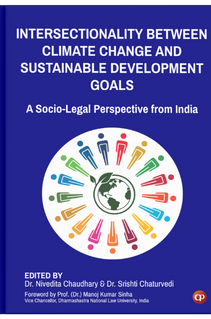The Mutual Synergy of Feminity and Ecologyin the State of Uttarakhand

by Dr. Aradhya Singh
Assistant Professor of Law, School of Law, University of Petroleum and Energy Studies, Dehradun, India.
10.46679/9788196780524ch04
This chapter is a part of: Intersectionality Between Climate Change and Sustainable Development Goals: A Socio-Legal Perspective from India
ISBN (Ebook):978-81-967805-2-4
ISBN (Hardcover Print):978-81-967805-0-0
ISBN (Softcover Print):978-81-967805-3-1
© CSMFL Publications & its authors.
Published: August 28, 2025
https://dx.doi.org/10.46679/9788196780524ch04
Abstract
Ecofeminism highlights the deep connection between women and nature, emphasizing women’s nurturing role in environmental conservation rather than ownership or control. Historically, women’s involvement in environmental stewardship grew significantly, particularly after men migrated for industrialization. Despite this, women remain largely unrecognized in policymaking at national, state, and local levels. Acknowledging women’s contributions can integrate their traditional ecological knowledge into global strategies for reforestation, organic farming, and sustainable resource management. A gendered perspective on environmental sustainability ensures that women are included as decision-makers alongside men. This chapter explores how gender theories influence environmental laws and policies, focusing on feminist perspectives and gender equality, particularly in Uttarakhand. It also examines the patriarchal dominance in environmental discourse and critiques Western reductionist views that have marginalized both nature and women. The global challenge to the notion of progress tied to environmental degradation and women’s subjugation is central to the discussion.
Keywords: Eco-feminism, gender, policymaking, traditional practices, women.
References
- Bhai, S. (1999). Raksha Sutra Movement: A women’s campaign to save Uttarakhand forests.
- Manushi, (110), 25–28. https://pubmed.ncbi.nlm.nih.gov/12322447/
- Boeve-de Pauw, J., & Van Petegem, P. (2011). The effect of Flemish eco-schools on student environmental knowledge, attitudes, and affect. International Journal of Science Education, 33(11), 1513–1538.
- Gruzalski, B. (1993). The Chipko movement: A Gandhian approach to ecological sustainability and liberation from economic colonisation. In A. K. Dey (Ed.), Ethical and political dilemmas of modern India (pp. 100–125). Palgrave Macmillan.
- Guha, R. (1989). The unquiet woods: Ecological change and peasant resistance in the Himalaya. Oxford University Press.
- Madhavan, A., & Narayana, S. (2021). Violation of land as a violation of feminine Space: An Ecofeminist reading of Mother Forest and Mayilamma. Tattva – Journal of Philosophy, 12(2), 13–32.
- Mies, M., & Shiva, V. (2014). Ecofeminism. Zed Books.
- Moore, N. (2004). Ecofeminism as third wave feminism? Essentialism, activism and the academy. In S. Gillis, G. Howie, & R. Munford (Eds.), Third wave feminism (pp. 227–239). Palgrave Macmillan.
- Rawat, K. S. (2000). The Maiti movement: Blending ecology with tradition. Himalayan Environmental Studies Journal.
- Shiva, V. (1988). Staying Alive: Women, Ecology, and Development. Zed Books.
- Shiva, V. (2010). Staying alive: Women, ecology and survival in India. Zed Books.
- Singh, J. S., Pande, U., & Tewari, A. K. (1984). Man and forests: A Central Himalayan case study. Ambio, 13(2), 80–87.
- Teran, M. Y. (2016). The Nagoya Protocol and Indigenous peoples. The International Indigenous Policy Journal, 7(2), Article 6. http://ir.lib.uwo.ca/iipj/vol7/iss2/6.
- The Statesman. (2019, April 25). Maiti Andolan: Plant a happy memory. https://www.thestatesman.com/supplements/section/maiti-andolan-plant-happy- memory-1502758061.html.
- Tiwari, R. R. (2019). Gandhi as an environmentalist. Indian Journal of Medical Research, 149(Suppl), S141–S143.
- Veak, T. (1999). [Review of Feminism & Ecology, by M. Mellor]. Science, Technology, & Human Values, 24(3), 402–404.
This book is available worldwide via EBSCOhost Academic Collection, EBSCO E- books, Google Play Books, Amazon, World Cat Discovery Service/OCLC, CSMFL Bookstore, and 200+ book resellers and academic content vendors.
Statement on Publication Ethics
We, at CSMFL Publications, are committed to ensure the unbiased and transparent publishing, and upholding the high standards of editorial integrity in our publications. To know more, please read our Statement on Publication Ethics, Editorial Integrity & Misconduct